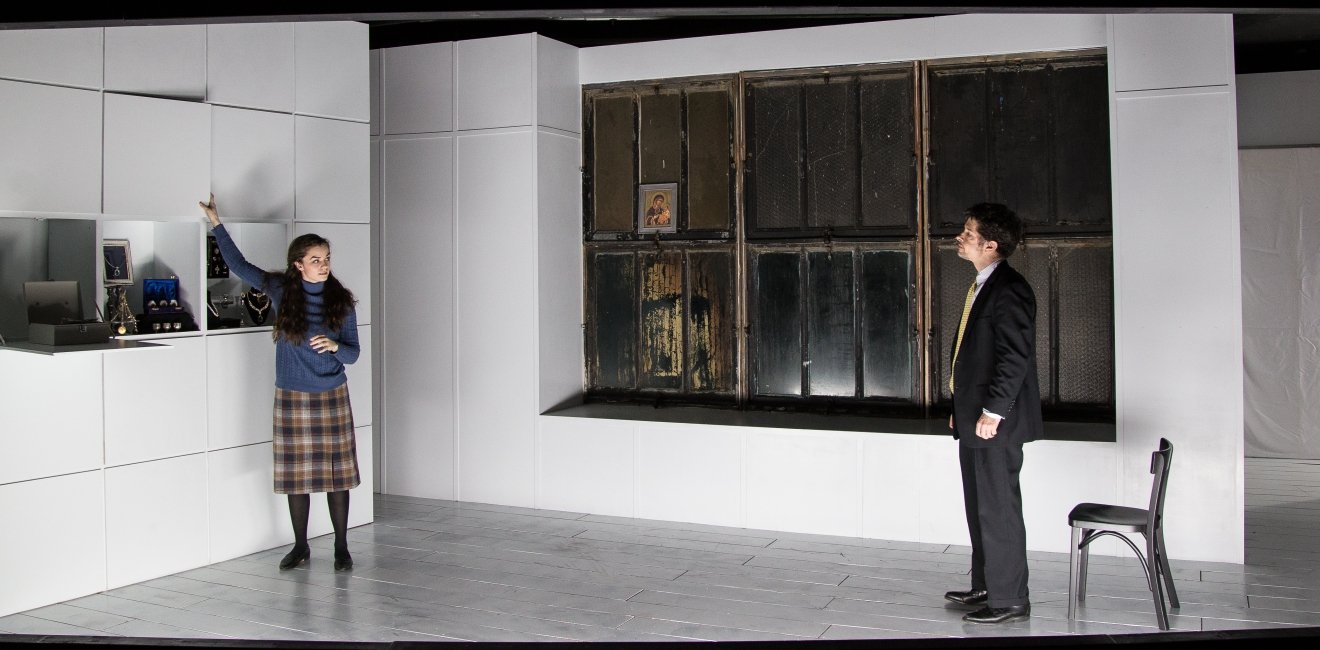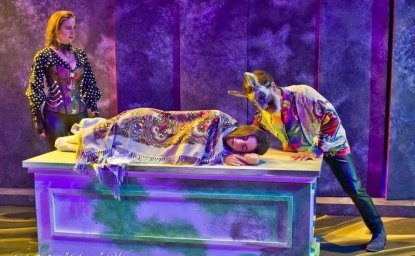
Zeljko and Natasha Djukic have shaped one of the most inventive theater companies in one of the most creative theater communities in the country: TUTA Theatre in Chicago. Named after the Serbian word for bedpan, TUTA promotes European-style psychological theater through the dramatic restaging of modern and classical works with startling design and passionate acting. Their productions routinely receive rave reviews from the city’s toughest critics in a highly competitive theatrical environment. Critics from the Chicago Tribune meant as a compliment the observation that TUTA productions were unlike anything else in the city. This is high praise in a city of committed audiences who value honest presentation of dramatic work over celebrity and gimmick.
Zeljko and Natasha arrived in Washington, D.C. in 1990 from Serbia to pursue further training at the University of Maryland, College Park. A graduate of Belgrade’s Drama Arts School, Zeljko added additional degrees to his resume and subsequently taught at several institutions including the University of Maryland and James Madison University. Designer Natasha similarly advanced her skills and taught full-time at James Madison. Together in 1995 they established the TUTA to bring challenging theater with unique and exceptional ideas to American audiences.
They moved the company to Chicago in 2002 where they quickly caught the attention of local theater devotees. For Zeljko and Natasha, Chicago offered a gritty urban energy and authenticity they found missing in other American cities. A storied theater town, Chicago already was home to audiences and actors well-prepared to tackle their brand of theater. Beyond her work for TUTA, Natasha crafted costumes and sets for several other Chicago theaters including the legendary Steppenwolf Company and the Light Opera. In moving from Washington to Chicago, Zeljko and Natasha found a creative environment which embraced the contradictions of life that elude confident certainties and proclamations.
As they settled into their Chicago life, Zeljko and Natasha sought to energize American theater both by presenting new works and by training a cohort of theater professionals inculcated with Eastern European dramatic traditions. Their company has nurtured rising talent through studios and various productions insuring a steady stream of actors capable of performing the kind of theater they valued from their years in Belgrade.
Following several early successes -- including a well-received adaptation of “Alice in Wonderland” -- Zeljko and Natasha secured their positions within the Chicago community with a stunning staging of Chekhov’s “Uncle Vanya.” Critics called their production of the Russian classic the best work in Chicago theater for 2008. Indeed, reviewers ran out of superlatives for the production, calling it compelling, extraordinary, lingeringly lovely infused with tenderness and humanity. They deemed Zeljko’s direction to be a masterpiece of subtlety and simultaneously admired Natasha’s costumes. One critic, Venus Zarris, writing for the “Steadstyle Chicago” website concluded that the production proved to be “nothing short of the quintessential ‘Uncle Vanya,’ sure to delight the Chekhov devotee and novice alike.” Russian-language theater critic Sergei Elkin considers this and other TUTA’s productions to be landmarks of Chicago theatrical life.
TUTA has brought contemporary European theater to the American Midwest, having presented a half-dozen world premier productions as well as nearly as many American premiers. Almost all their plays were new to Chicago. These include important productions of Guy de Maupassant’s “The Jewels,” featuring noted Chicago actor Kirk Anderson; Berlin-based Blue Man Group veteran Martin Marion’s whimsical “The Anyway Cabaret (an animal cabaret)” satirizing the events of the day; plus classics by Brecht, Chekov, and Dostoevsky. Known for presenting the works of Serbian playwrights -- including the world premieres of Ugljesa Saijtinac’s “Huddersfeld” and Milena Markovic’s “Tracks” – TUTA similarly has presented major works from the contemporary Russian repertoire including the American premier of notable Yekaterinburg playwright Oleg Bogaev’s “Maria’s Fields.”
The Djukics have experimented with a variety of formats to engage new audiences. TUTA has performed cabaret-style, presented works responding to contemporary events and has run dramatic laboratories in such popular venues as the Pritzker Pavilion stage in Millennium Park. These settings cultivate new audiences for the company far beyond Chicagoans embracing the avant-garde.
Among the several components of TUTA’s success have been Zeljko and Natasha’s dedication to developing new talent and an appreciative audience; as well as their belief in the importance of European dramatic theater – both classic and contemporary – for American viewers. In bringing Eastern European theatrical traditions to the New World, they have reinvigorated the Chicago stage in return.
Artistic Visionaries and Community Creators
The power of the performing arts to nurture inclusive communities has been praised widely in recent years; so much so that “creative placemaking” is now seen as a powerful tool in community development. The supportive role of community in fostering artistic innovation is less acknowledged. This series highlights the work of visionaries for whom creating communities of students, protégés, audiences, and donors has become a strategic element in transforming their arts.
Author

Former Wilson Center Vice President for Programs (2014-2017); Director of the Comparative Urban Studies Program/Urban Sustainability Laboratory (1992-2017); Director of the Kennan Institute for Advanced Russian Studies (1989-2012) and Director of the Program on Global Sustainability and Resilience (2012-2014)
Explore More in Artistic Visionaries and Community Creators
Browse Artistic Visionaries and Community Creators
Mark and Susan Marie Rhea and Irish Theater

Hugo and Rebecca Medrano and Hispanic Theater

Andrew Kingsley, Andrew Vaught and Social Impact Theater

